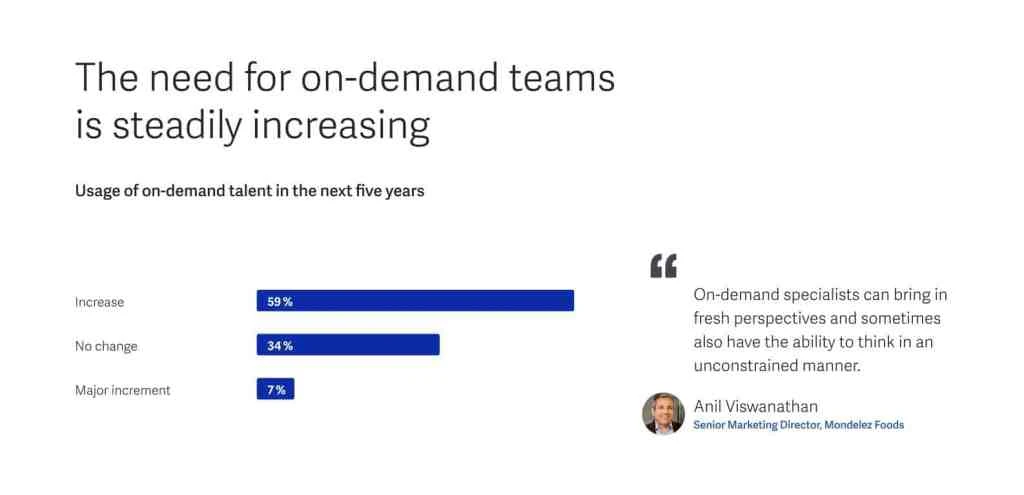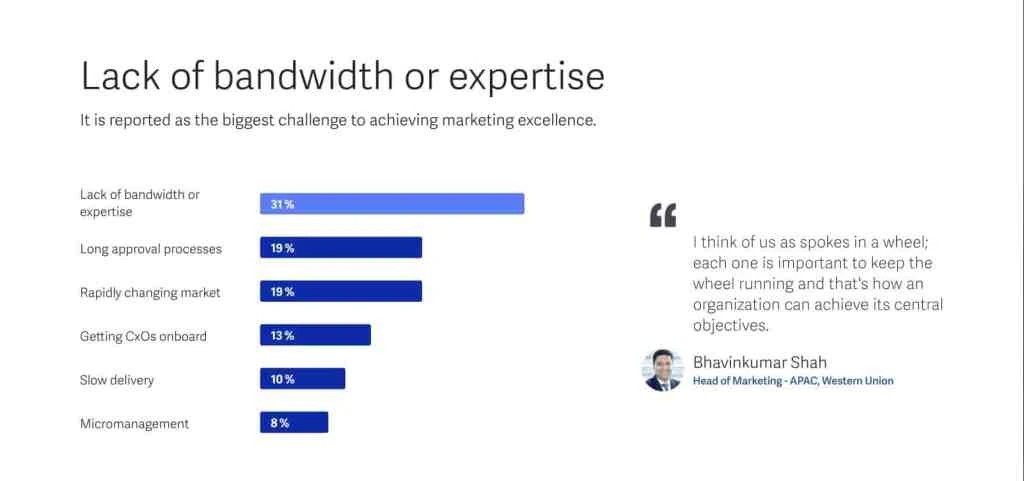-
Marketers agree on blended workforces and smaller core teams as the key trends for marketing teams.
-
66% of marketers predict the usage of freelance talent to increase at their marketing organizations.
-
Nearly half of senior marketers expect their teams to be fully remote.
-
Lack of bandwidth or expertise, long approval processes, and the rapidly changing market are major challenges for marketers today.
Businesses around the world are adapting to the new normal. The evolving nature of marketing in a post-COVID world has led to a shift in how teams are being built. The current global recession has increased the pressure for marketers to perform and make more sales.
Our team, Hire Digital – a platform that matches leading businesses with world-class marketers, engineers and other digital experts – led a discussion among hundreds of senior marketing professionals to understand how they are adapting. These insights shed light on where APAC marketing organizations are headed.
How are marketing teams structured in the new normal?
Blended workforces and smaller core teams
Almost half of the marketing teams have used freelance teams or have plans to start soon. Hence, marketers are bringing in outside expertise for most non-core activities to pilot new initiatives and quickly scale their campaigns.
Moreover, digital freelancing marketplaces are catching up to traditional methods of outsourcing. 34% are using digital marketplaces to find support, while only 12% more continue to look through traditional ways.
Our report also revealed that the need for freelance teams is steadily increasing – 59% of the correspondents say that there’s been an increase in freelance services in the last five years.

“On-demand specialists can bring in fresh perspectives and sometimes also have the ability to think in an unconstrained manner,” said Mondelez Foods’ Senior Marketing Director Anil Viswanathan.
Most believe that marketing teams can be remote
Surprisingly, 47% of the senior marketing correspondents believe that their teams can be fully remote. Despite the frequent collaborations required by the marketing field, teams are starting to adjust and work this setup to their advantage.
“The challenge of remote working presented itself as an opportunity for us. After COVID, our innovation cycles have improved by 30%,” shared Unilever Global Brand Director Duygu Ersoy.
Meanwhile 26% of the correspondents believe that up to half of their marketing staff may work remotely. Only 5% are uncertain or believe that none of the team should work remotely.
Senior marketers believe the lack of bandwidth or expertise is their biggest challenge
So what brought about these structural changes?
We discovered that marketers have a lot on their plates, but often not enough resources. Enterprises also struggle with long approval processes, whereas the pandemic-led shifts need them to be more agile than ever.

According to our survey report, the teams’ top three biggest challenges to achieving marketing excellence are:
#1: Lack of bandwidth or expertise
31% of the correspondents believe that lack of bandwidth or expertise is their biggest challenge in achieving their goals. As industries expand, more specific marketing roles are emerging. Thus, this is why freelance teams are starting to fill the high demand for certain marketing functions.
#2: Long approval processes
19% of the correspondents think that long approval processes are the main blockers of their success.
It’s no surprise that there have been longer processes with the rapid shift of team structures in the past three years. With teams adapting to a remote or hybrid setup, there must be more delays of communication, which leads to delays in approvals.
#3: Rapidly changing market
Consumers’ needs and behavior have also rapidly changed in the past three years. The world experienced a hyper-accelerated digitalization to the point that customers now consume much more information and purchase more products online.
“30 years ago, marketing was more art, less science. The job descriptions for marketing reflected that. Today (last 5 years), marketing has pivoted to more science, less art,” stated IBM Global Businesses Services Asia Pacific CMO Arun Cavale.
Marketing teams now have more consumer data from online transactions, which they can utilize for their growth. However, some teams may have had a hard time catching up with the changes.
Other challenges
13% of the respondents said that getting Chief Experience Officers onboard was part of their biggest challenges, while 10% believed that slow delivery was their main blocker. Lastly, 8% believe that micromanagement is still a problem.
Are teams agile enough to face these challenges?
Marketing teams require agility to deal with the ever-fleeting market shifts in the post-pandemic world. But do their leaders believe that they’re agile enough?
Most do. Overall, 89% of the marketing organizations believe that their team is either quite agile or somewhat agile, but still has room for improvement.
To be specific, 51% of them believe their team is somewhat agile, 38% think they’re quite agile, and only 11% think their team isn’t agile at all.
What are key capabilities marketing teams are focusing on?
The marketing field has evolved along with the online economy. Thus, marketing teams’ focus have shifted over the years as well. Here are the main key capabilities that they believe achieve marketing excellence:
-
Strategy & insights (29%)
-
Customer experience and personalization (24%)
-
Analytics & ROI (20%)
-
Creative and content (12%)
-
Media and channel activation (9%)
-
Product & pricing (6%)
Of course, strategy and insights are still important to drive successful marketing campaigns that connect with a desired audience, but it seems like senior marketers are catching on with the personalization trend. This is backed up by a Epsilon and GBH Insights report, which showed that 80% of adult participants desire personalized content from retailers.
“Client centricity, external eminence, and solid sales relationships are skills every senior marketer should have,” said Cavale.
Methodology
- Hire Digital led a discussion with APAC marketing leaders in September 2021 to understand how they were driving organizational success with their teams. Over 100 senior marketing professionals participated in polls that are featured in this report.*
Respondents included in the survey are from the following industries:
-
Manufacturing Energy, Utilities & Waste
-
Education Media & Internet
-
Software Insurance
-
Hospitality Organization
-
Business Services Government
-
Retail Real Estate
-
Finance Healthcare Services
-
Telecommunications Agriculture
-
*Holding Companies & Conglomerates *
-
Law Firms & Legal Services
-
Transportation Hospitals & Physicians Clinics
-
Construction
Read more:
